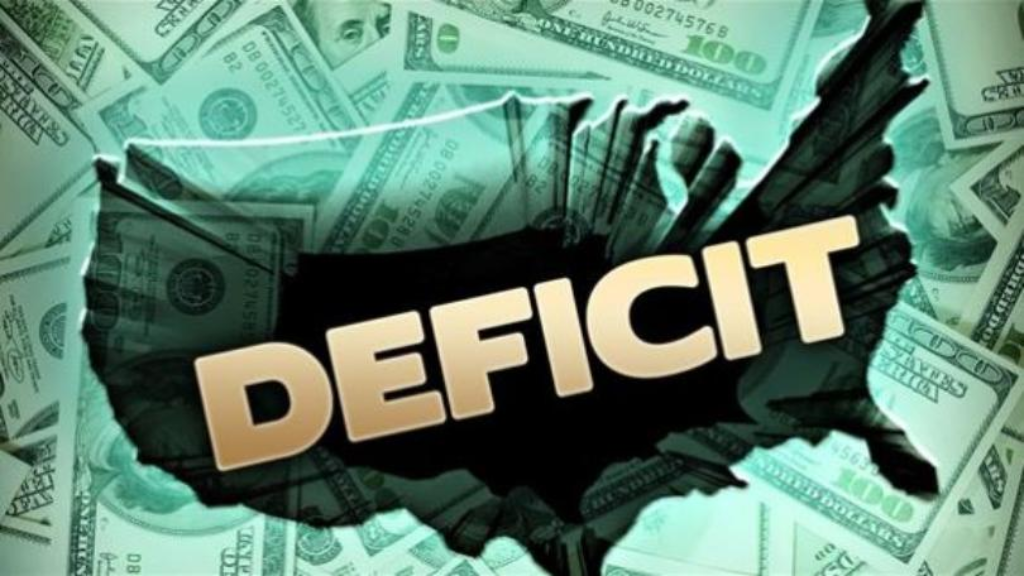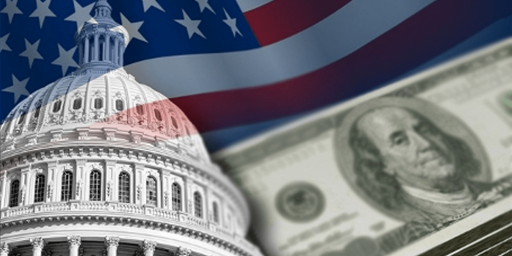Federal Budget Deficit Ends Fiscal Year Just Shy Of $1 Trillion
Don't worry folks, we'll make it past that mark quite easily over the course of the new Fiscal Year.

As Congress continues to investigate the facts and circumstances surrounding the President’s discussions with the President of Ukraine regarding investigations of former Vice-President Biden and his son has uncovered all kinds of interesting information. For example, this little tidbit was buried in an NBC News story about the text messages exchanged between top State Department officials regarding the phone call and the overall status of U.S. dealings with Ukraine:
The federal budget deficit for 2019 is estimated at $984 billion, a hefty 4.7 percent of gross domestic product (GDP) and the highest since 2012, the Congressional Budget Office (CBO) said on Monday.
The difference between federal spending and revenue has only ever exceeded $1 trillion four times, in the period immediately following the global financial crisis.
The deficit, which has grown every year since 2015, is $205 billion higher than it was in 2018, a jump of 26 percent.
The CBO has warned that the nation’s debt is on an unsustainable path. Higher levels of debt increase borrowing costs, make it harder for the government to battle economic downturns and increase the share of future spending devoted to paying off interest costs.
Since President Trump took office, the GOP has passed a massive tax cut package that reduced revenue, while Democrats and Republicans have agreed to increase spending year after year.
Budget watchers note that the main drivers of the deficit, however, come from automatic spending programs such as Social Security, Medicare and Medicaid.
“Democrats and Republicans must be held responsible for the outrageous deficit reported today by the CBO,” said Jason Pye, vice president of legislative affairs at the conservative advocacy group FreedomWorks. “This unsustainable situation is only going to get worse,” he added.
Hitting $1 trillion on the Federal Budget Deficit would not, unfortunately, be unprecedented. We saw those levels nearly ten years ago during the early years of the Obama Administration when the deficit exceeded $1 trillion in consecutive years. In that case, though, the unfortunate threshold was passed due to a combination of two factors. The first, of course, was the aftereffects of the Great Recession and the negative impact that event had on Federal tax revenue. The second can be traced to the increased spending that we saw especially in the first year of the Obama Administration due to the passage of a massive recovery package that was deemed to be necessary to push the economy out of recession. As it turns out, of course, the economy had already started working its way out of recession before the spending from the stimulus package went into effect, but that one-time increase in spending, combined with several years of decreased revenue meant that we experienced what were then the highest budget deficits in our history.
That period of high deficits was short-lived, though, both for economic ad political reasons. Economically, it was somewhat inevitable that the deficit would start shrinking once the economy started growing again and federal revenue returned to more normal levels. Politically, the higher deficits, along with the Democratic push for health care reform, tbecame a campaign issue for Republicans and their victories in the 2010 midterms led to several showdowns with Democrats and, eventually, the passage of the Budget Control Act of 2011 that actually managed to put some breaks on spending that, along with increased revenues due to the economy recovery, reduced deficits steadily for most of the remainder of former President Obama’s time in office.
The situation is quite different this time. While economic growth has been lackluster at best during the balance of the President’s first term in office, roughly matching that which we saw in President Obama’s final years in office, we have not been in a recession nor are there any immediate signs that we’re headed that way. In fact, we are now in the 124th month of the recovery and all signs are that we’ll stay in positive territory for at least the balance of 2019. That being said, we’re also at a point where financial markets are becoming increasingly sensitive to higher levels of debt and interest rates both in private and public hands. Ordinarily, that should lead the Congress and the President to be more sensitive about taking action that increases the deficit and debt. Instead, we have had the exact opposite.
When the final budget deal was put forward in mid-February of last year, for example, it included massive spending increases in almost every budget category and busted through the controls that had been put in place during the Obama Administration. Additionally, in late 2017 the Republicans were able to push through one of the few legislative achievements of the President’s first term, the Tax Cuts and Jobs Act. This tax package, which reduced taxes across nearly all income levels as well as at the corporate level, was supposedly intended to increase economic growth to levels unseen since the economic recoveries of the 1980s and 1990s, something that at least theoretically would have led to significantly higher revenues. That hasn’t happened, obviously. Instead, economic growth over the past two years has roughly stayed within the same 2.0-3.0% range we saw from 2013 through 2017. The result of this has been that deficits have largely taken the pessimistic track that the Congressional Budget Office foresaw in its analysis of the tax cut package rather than the far more optimistic estimates of the Trump Administration.
The result of this, of course, has been the inevitable rise of budget deficits and the national debt to the levels we see today, levels that Republicans would have been screaming about if the President was a Democrat, but which they are ignoring under a Republican Presidency. As The New York Times has noted, this effectively means that Republicans have learned to love the deficits and debt they once claimed to abhor. This is the same Republican Party which had spent the Obama years lecturing Washington about spending and deficits. In the Trump Era. that same party has become the party of deficits and debt. By April of last year, the Congressional Budget Office had officially forecast that we’d be seeing trillion dollars deficits by the end of Fiscal Year 2019 and just a few months later, the national debt crossed a new benchmark and was north of $21 trillion
The word hypocrisy comes to mind. This, after all, is the same Republican Party that has preached the gospel of fiscal responsibility for years while at the same time ignoring those ideas when it has political power. The supposed Republican fidelity to fiscal responsibility and its concern about rising Federal Budget Deficits and the National Debt is something that has proven to be little more than a political slogan that was largely based on who controlled the White House. When former Presidents Bill Clinton and Barack Obama were in power, Republicans argued that out of control spending and deficits were destined to drive up interest rates, cause the national debt to explode, and increase interest rates. They used these issues as political cudgels against the Democratic White Houses and members of Congress during both Administrations and, of course, as a way to appeal to voters and supporters. Riding this wave, the GOP was able to take control of both Congress and, eventually, the White House in 2000 and 2016. In the wake of both elections, though, everything changed.
As a result, here we are back in the land of trillion-dollar deficits that are likely to continue for years to come unless revenues increase and spending decreases. Regardless of who’s in power in Washington after November 2020, that quite simply isn’t going to happen.
Thanks, Trump. Thanks, Republicans. This is all your doing.





Couple of points:
A useful way to look at budgets and deficits is to frame them as percentages of GDP. Revenue has plummeted as % of GDP to about 16.4% in FY18 as opposed to a historical average of about 18%. In addition, absolute revenue has also declined slightly in the last two years.
The dynamic scoring insisted upon by Republicans and supply siders have proven to be bogus. Surprise there!
My conversations with my congressman have not been fruitful as he insists there is no revenue problem, only spending problems. He resolutely will not propose any spending cuts because he knows that any cuts have to come from Medicare, SS, and Defense.
The CBO has a useful document (https://www.cbo.gov/budget-options) that provides options in spending cuts and revenue increases. I’m sure it is totally ignored.
Deficits are not a problem, unless there is a Democratic POTUS. Then they are awful.
Steve
At this point voting for a Republican government is a vote for high deficits. Anyone who does not see this is being willfully ignorant. I say this as someone who does not view deficits as inherently bad but during periods of economic expansion they are not helpful.
We are seeing the same thing in Canada for our election right now. The Conservative Party is pushing all kinds of tax cuts, seemingly but not explicitly directed at higher income people, without any mention of reducing spending at all. At the same time they are hitting the current government for budget deficits. My real worry is that this will work.
Don’t worry. Billionaires are now paying a lower effective tax rate than the working class. And isn’t that what really matters? Don’t we want to reward our entrepreneurs and heiresses? Don’t those who have
raped and pillagedstriven deserve their rewards? I’m sure we’ll see a wave of productive investment any day now. /s@gVOR08: it’s a good time to be a billionaire. There are few bad times to be a billionaire, unless the peasants break out the guillotines, but this seems like a fine time.
Now there’s a great way to drop the Gini Index…